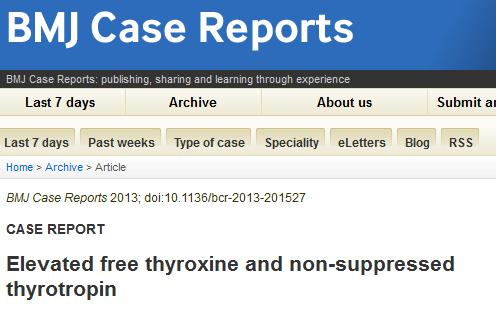We are all different. Most of us would be extremely ill with an FT4 of 36.9 (without needing to check the precise reference range!). At the same time, we would probably have a suppressed TSH - not one in the range 6.78 to 22.1. But this case seems to prove that for one individual these results really do make sense.
BMJ Case Rep. 2013 Oct 28;2013. pii: bcr2013201527. doi: 10.1136/bcr-2013-201527.
Elevated free thyroxine and non-suppressed thyrotropin.
Mok SF, Loh TP, Venkatesh B, Deepak DS.
Source
Department of Medicine, National University Hospital, Singapore, Singapore.
Abstract
A young man was diagnosed with hyperthyroidism 10 years prior to current presentation after a random health screening revealed an elevated free thyroxine (fT4) of 36.9 pmol/L. During that time, he saw multiple physicians and was treated with carbimazole intermittently. His repeat thyroid function tests showed persistently elevated fT4 ranging 25-35.7 pmol/L and non-suppressed thyroid-stimulating hormone (TSH) concentrations of 6.78-22.1 mIU/L. He had a smooth, firm and non-tender goitre. At our institution, laboratory interference was first excluded by serial dilution study (TSH) and retesting of TSH and fT4 on alternate assay, which gave reproducible results. His normal α-subunit and sex hormone binding globulin, partially suppressed TSH by high dose triiodothyronine (T3), and positive TSH response to thyrotropin-releasing hormone stimulation were consistent with resistance to thyroid hormone syndrome. The diagnosis was confirmed by direct sequencing of thyroid hormone receptor-β gene, revealing a heterozygous R320 L mutation that causes reduced T3 affinity and reduced corepressor dissociation.
PMID: 24165508 [PubMed - in process]
ncbi.nlm.nih.gov/pubmed/241...
Rod

 , so here is another one (free to access and print!):
, so here is another one (free to access and print!):